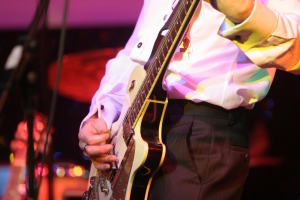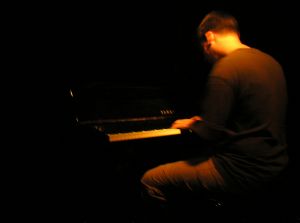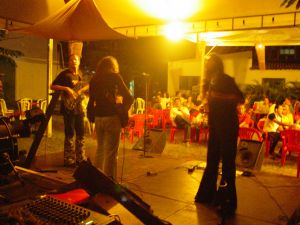Learn to Play Your Instrument
With all the techno wizardry available to musicians these days, many believe they can sidestep the learning and practice phase and simply program their sequencers to play a keyboard and that's all they need to do to create great music.
Unfortunately, a great deal of this kind of so-called music has been polluting the radio airways for too many years now and people are quite frankly getting tired of the same old same old.
More and more people are yearning for "real" music again after decades of electronic, computer generated noise that DJs are so in love with and have been ramming down our collective ear canals. But DJs are generally not musicians, so what do they know?
 Real musicians are those hard working people that took the time to learn how to play their instruments. They practiced every day and eventually gained sufficient mastery over them that they were able to perform in front of a live audience and gain lots of appreciative applause for their efforts.
Real musicians are those hard working people that took the time to learn how to play their instruments. They practiced every day and eventually gained sufficient mastery over them that they were able to perform in front of a live audience and gain lots of appreciative applause for their efforts.
Make it Real
There is a definite difference between a song that has been performed by real musicians playing real instruments and one that has been computer generated. And by that I mean someone sat down with a keyboard and sequencer and programmed the whole thing while a live singer and backing singers sang over the top.
Sequenced "music" has no feel to it no matter how creative the singer(s) try to be. The emotion and creativity that comes from the musicians is what gives a recorded song life and you can bet a good singer will naturally pick up that buzz and their performance will be even better.
What I'm trying to do here is to put into words what is happening when a song is created "real" as opposed to "artificial" and that's not an easy thing to do. To really get an appreciation of the difference between the two, you have to experience it first hand by sitting down and comparing two recorded songs that are similar but where on is performed by real musicians on real instruments and the other is created on a keyboard or worse, spliced together using sampled instruments and sequenced.
A Reason to Learn to Play a Musical Instrument
If there were only one reason needed to have the desire to pick up a musical instrument of your choice and decide to go all in and learn how to play it, it has to be because you truly have a need to express your artistic and creative energy in this way. Because make no mistake, learning how to master any instrument takes no small amount of dedication.
I'm talking from experience here. As a child, I learned to play the clarinet and spent countless hours, days, weeks, years practicing and practicing and then practicing some more. I got pretty good by the time I was a teenager by which time I had "discovered" pop music and all of a sudden it became quite clear to me that no one was playing clarinet in these top bands!
I wanted to play guitar!
I started on a four string ukulele and self taught myself from books. I learned chords and it wasn't long before I could play some simple tunes and sing along to them. It also wasn't long before I knew I needed a "real" guitar!
So next came a second-hand acoustic that I spent as much time and practice on as I ever spent on that clarinet, which got consigned to its case and saw the light of day less and less frequently, to the chagrin of my mother who was desperate for me to develop into a great jazz player. No chance. I wanted to play rock guitar like Jimi Hendrix, Eric Clapton and Jimmy Page (et al).
You Have to Want It
 What I'm saying here is that to become am accomplished player of the instrument of your choice, you really have to want it first. You have to have an all-consuming desire to master that thing and then you have to turn that desire into dedication and determination.
What I'm saying here is that to become am accomplished player of the instrument of your choice, you really have to want it first. You have to have an all-consuming desire to master that thing and then you have to turn that desire into dedication and determination.
You might develop a desire to play a different instrument along the way as I did. That's fine because it expands your horizons in terms of musicianship. I got interested in playing the bass guitar and the keyboard and learned how to play them as well. But my main instrument was and always will be the guitar.
My desire extended into recorded music and it was probably because I had a big interest in playing different instruments, I found I have a very good ear for dissecting a recorded song and hearing every individual instrument (as long as there are not too many all at once). This is a skill you can develop through practice and it will stand you in very good stead when you come to record in the studio too, because it will help you to break down songs into their component parts.
I found it very useful to be able to record songs playing all the instruments myself except the drums, which I dabbled with, but never had the inclination to progress. I was also lucky in that I have two musical brothers: one plays drums and the other is a dang good boogie woogie piano player!
So they often got conscripted into my home recording sessions to help me out in the places I couldn't do myself.
You Need People
 That sort of leads me onto another side of playing real, honest to goodness musical instruments. For the most part you will need other musicians to help you out when performing songs, including the ones you write yourself if you decide that's what you also want to do. I did and it's very satisfying.
That sort of leads me onto another side of playing real, honest to goodness musical instruments. For the most part you will need other musicians to help you out when performing songs, including the ones you write yourself if you decide that's what you also want to do. I did and it's very satisfying.
That's why we have bands and not just a bunch of solo musicians occupying stages and TV and radio shows. Sure, you could argue that with a keyboard/sequencer arrangement you can do it all yourself but the finished result will be wooden, lacking in depth and devoid of soul.
Music has to have soul because it has to move people by being emotive. Musicians performing with real instruments in real time naturally generate that emotive force.
That's because there is a mutual energy being transferred from one to the other when they are performing and that emotive energy gets boosted in amplitude and velocity as it whirls round the room gaining power and presence lifting each individual member of the band. It's really quite a powerful experience especially when you are performing to a live audience and that energy gets picked up by everyone and radiated back at you.
I have often said playing a great gig can be better than sex in terms of the energy high you get from it. And that's without any artificial substances being brought into the mix. In fact, I always play totally sober because the buzz I get from the performance itself is a better high than any drug.
Some younger players who are, shall we say, partial to certain stimulants might want to try that sometimes. It will surprise and amaze you!
Be Prepared to Work
Bottom line is that the rewards are enormous when you become an accomplished player able to stand up on stage in front of a live audience and perform, to a very high standard, songs that move you, whether you wrote them yourself or you are covering. The experience of just knowing you played magnificently and getting such positive feedback from your audience to confirm what you already know is second to none!
I know I keep banging on about it, but to get to that level of expertise and ability, you are going to have to dedicate yourself to working hard at your chosen instrument and learn it inside out. You have to be able to get yourself to the place where you can close your eyes and play it perfectly.
When you can do that, you can really play!
